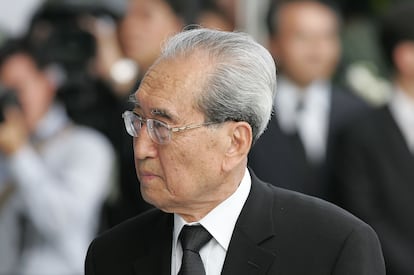Kim Ki-nam, the ‘North Korean Goebbels’ who forged the personality cult of Pyongyang’s leaders, dies
The North Korean propaganda mastermind helped cement the political legitimacy of the Kim family dynasty from the Cold War era to the present day

North Korea has bidden farewell to the main composer of the symphony that cemented the Kim dynasty’s power since the Cold War era. Kim Ki-nam, the propaganda mastermind who helped forge the personality cult of the country’s supreme leaders, died Tuesday at the age of 94, North Korea’s central news agency KCNA reported Wednesday. Despite sharing a surname, Kim Ki-nam had no blood ties to the ruling lineage. The official newspaper Rodong Sinmun praised his great loyalty to the Workers’ Party and to the rulers who have led the most hermetic nation on the planet with an iron fist since 1948. In the obituary, he is described as a “prestigious theoretician and outstanding political activist” who dedicated his life to the “sacred struggle to defend and strengthen the ideological purity of our revolution.”
Born into a family of longshoremen, Kim ascended the social ladder thanks to his involvement in political activities, according to the official biography published by North Korean media. He was a professor at Kim Il-sung University, where he “devoted himself to training competent talents to contribute to the sacred cause of building a powerful socialist country,” said KCNA. He thus gained the confidence of the regime’s founder, Kim Il-sung, and, in 1956, became a member of the Central Committee of the Workers’ Party. Ten years later, he was appointed deputy director of the Pyongyang propaganda machine, where he worked hand in hand with Kim Jong-il, father and predecessor of the current leader, Kim Jong-un. In 1985, Kim Ki-nam was promoted to head the Propaganda and Agitation Department, a post he would hold for 32 years and where he was succeeded by Kim Yo-jong, Kim Jong-un’s sister, in 2017.
Analysts agree that Kim Ki-nam was one of the main architects of shoring up the regime’s legitimacy for three generations and that he exerted great influence on the country’s policies. His role as the chief architect of official state narratives earned him notoriety in South Korea, where the media dubbed him the “North Korean [Joseph] Goebbels,” a reference to Nazi Germany’s propaganda minister, known for his mantra “a lie repeated a thousand times becomes a truth.”
Kim Ki-nam devoted six decades to “consolidate the ideological and theoretical foundations of the Party,” noted Rodong Sinmun, of which he was appointed editor-in-chief in 1976. The newspaper on Wednesday published his portrait accompanied by an obituary on its front page, relegating to page two a photograph of Kim Jong-un attending the wake. The North Korean leader will chair the state committee in charge of his funeral, which will take place Thursday, according to KCNA. The gesture highlights the North Korean leader’s close relationship with the former propaganda chief, as well as the importance Pyongyang attaches to his legacy. Kim Ki-nam was one of seven senior officials who accompanied Kim Jong-un in his late father’s hearse in 2011.
Kim Jong-un’s decision to personally lead the funeral arrangements also sends a message to party cadres, encouraging them to remain loyal to their government. State media say Kim Ki-nam “will live forever” thanks to his “contributions,” as they did in the obituary published after the death of Kim Jong-un’s mentor, Hyon Chol-hae, who they said had attained “eternal life” for his service to the supreme leader.
Kim Ki-nam was one of the few North Korean officials to have visited South Korea. In 2009, he led a funeral delegation after the death of South Korean President Kim Dae-jung, and met with then-South Korean President Lee Myung-bak. Kim Dae-jung was the driving force behind an era of reconciliation between Seoul and Pyongyang known as the “Sunshine Policy,” which lasted from 1998 to 2007. The Korean War (1950-1953) ended with the signing of an armistice rather than a peace treaty, which, in theory, means that the two Koreas have not formally ended the Cold War conflict. In 2000, Kim Dae-jung made a historic visit to the North that revived hopes for peace on the peninsula. That same year, he was awarded the Nobel Peace Prize.
Kim Ki-nam’s death comes at a time when Pyongyang is making important changes in its discourse, both domestically and internationally, as well as increasing its bellicosity. At the end of 2023, the North Korean authorities announced that the country would henceforth treat South Korea as a hostile enemy state and, this year, the idea of peaceful reunification was removed from the Constitution.
Sign up for our weekly newsletter to get more English-language news coverage from EL PAÍS USA Edition
Tu suscripción se está usando en otro dispositivo
¿Quieres añadir otro usuario a tu suscripción?
Si continúas leyendo en este dispositivo, no se podrá leer en el otro.
FlechaTu suscripción se está usando en otro dispositivo y solo puedes acceder a EL PAÍS desde un dispositivo a la vez.
Si quieres compartir tu cuenta, cambia tu suscripción a la modalidad Premium, así podrás añadir otro usuario. Cada uno accederá con su propia cuenta de email, lo que os permitirá personalizar vuestra experiencia en EL PAÍS.
¿Tienes una suscripción de empresa? Accede aquí para contratar más cuentas.
En el caso de no saber quién está usando tu cuenta, te recomendamos cambiar tu contraseña aquí.
Si decides continuar compartiendo tu cuenta, este mensaje se mostrará en tu dispositivo y en el de la otra persona que está usando tu cuenta de forma indefinida, afectando a tu experiencia de lectura. Puedes consultar aquí los términos y condiciones de la suscripción digital.









































